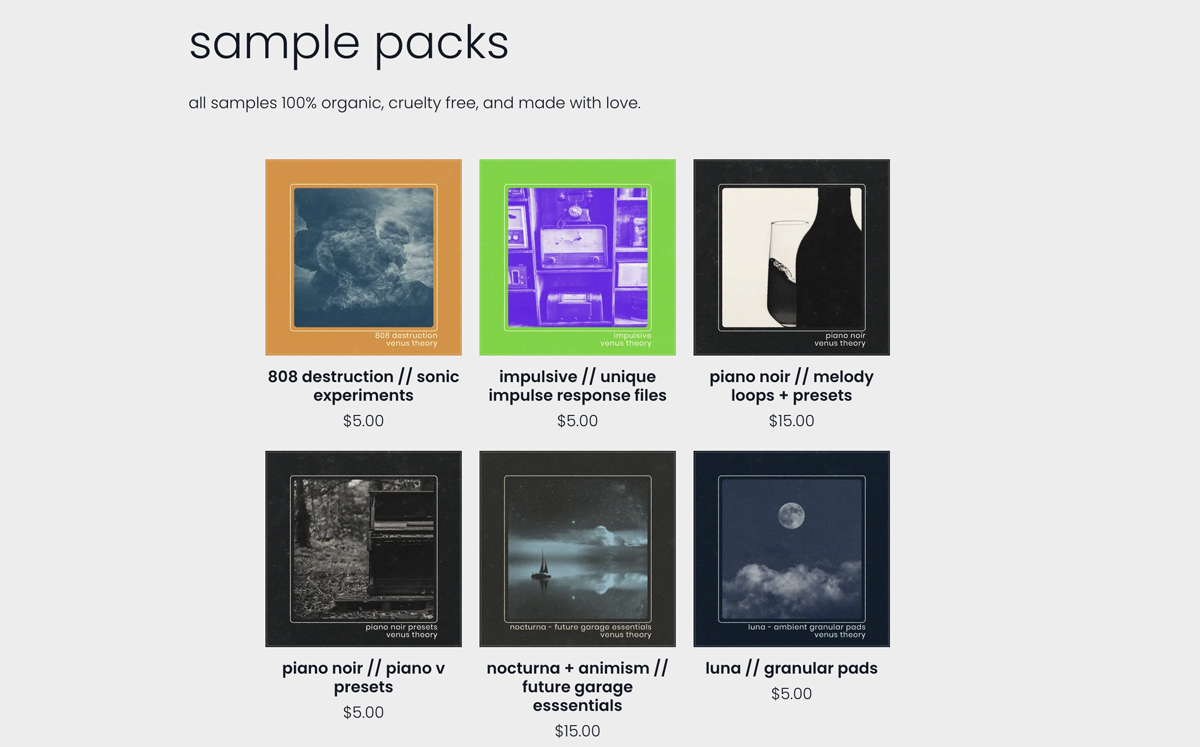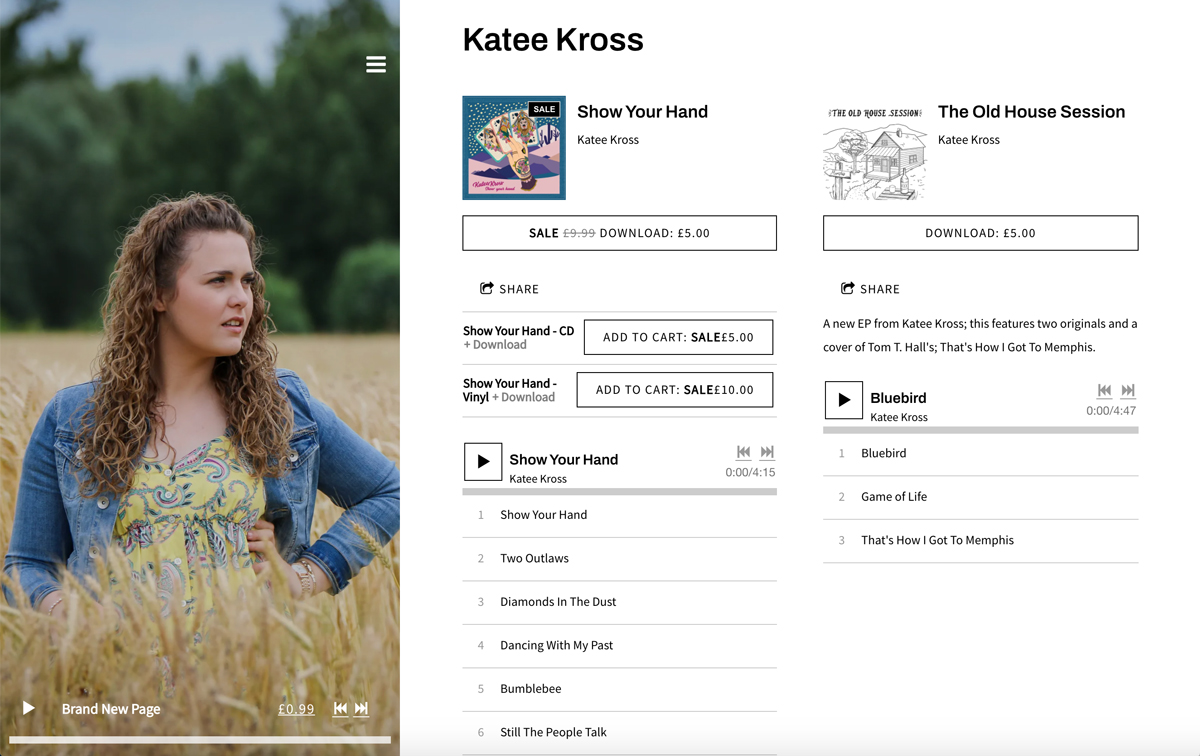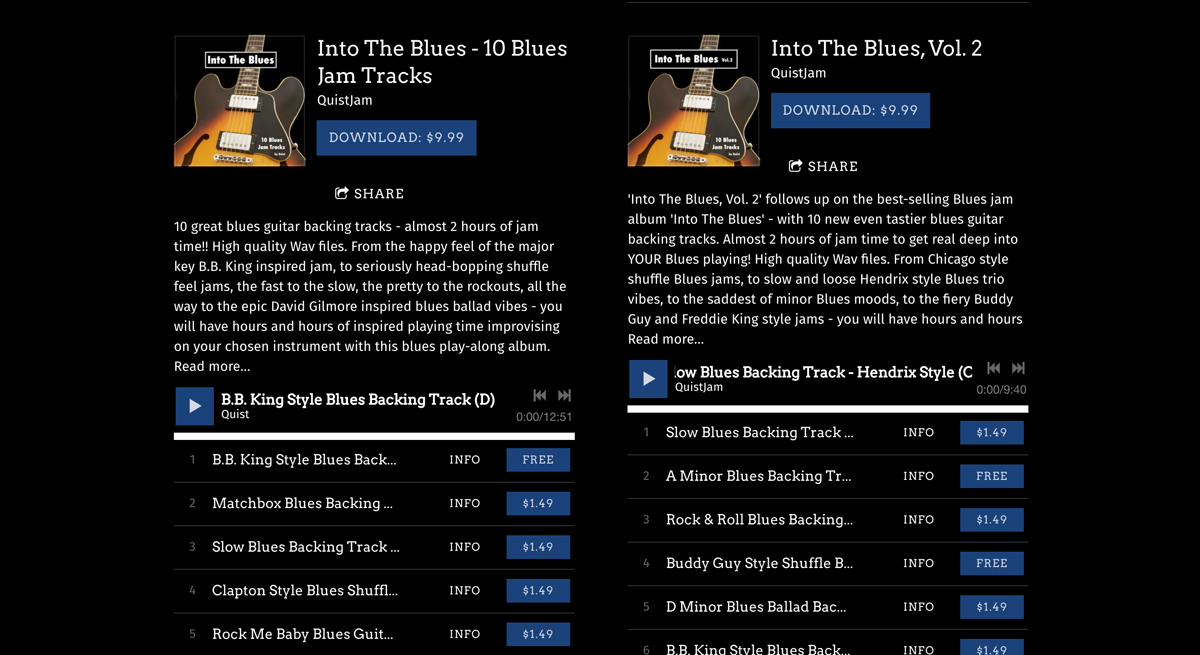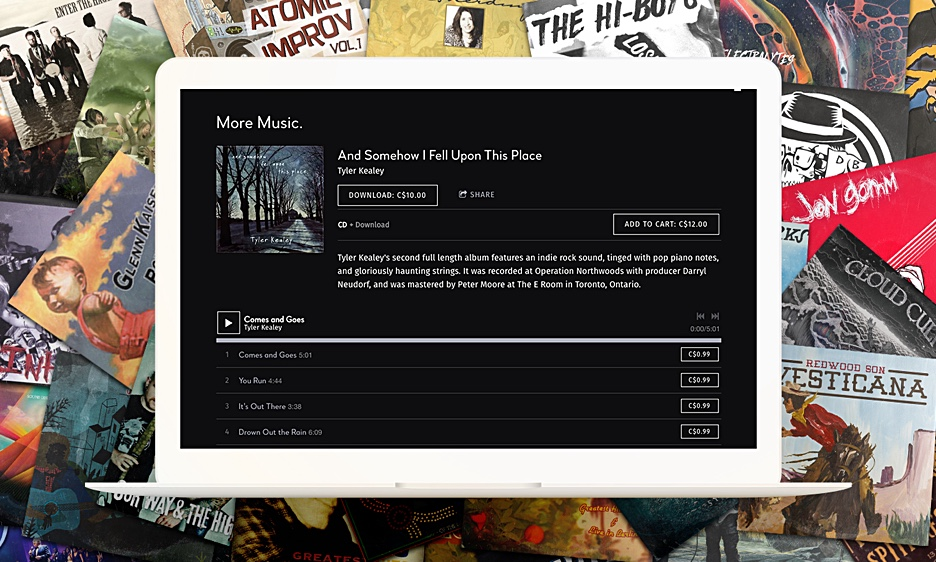Bandzoogle members have now earned over $80 Million in commission-free sales from their websites from music, tickets, merch, subscriptions, and more.
—Dave Cool, VP Bandzoogle (July 26, 2021)
This article originally appeared on the Bandzoogle Blog.
Making music has probably been a dream you’ve had for a long time. You spend hours putting your heart and soul into the creation of these melodies. Then you record your music, listening and editing and getting it perfect. It would be ideal to use this very music, which is an extension of who you are and what you’ve been through, as a way to support yourself in the pursuit of making more music.
The reality is, streaming isn’t going anywhere, and while it does help with discovery, it does not pay well. But when it comes to making money as a musician, investing in yourself by using your website to sell music can yield a better result than relying on streams.
Think of your music website as the hub for all of the efforts you put into marketing your music and building your brand online. This is the spot where people can visit to find out more; whether they discovered you on a Spotify playlist or saw a Facebook ad, draw them to your website to cement their support and create a true fan.
As a musician, your music is a strong point. While you might think there’s no money to be made in selling music, over the last year we’re seeing more and more people loyally supporting the artists they love.
To sell music online, focus your website on creating a few revenue streams that will work for you, which will set you up to spend more time actually making music.
Choose to sell music that you can continue to make, and that interests you. You might want to work on releasing singles, promoting and selling each one to your fans. If that doesn’t seem like much of a money maker, consider allowing your fans to pay what they want. You might be surprised at the amount a fan is willing to pay in order to support the creation of more music.
If you’re looking to release a full album, devote your energy to making music and taking your fans on the journey. Setting up a pre-order or a crowdfunding campaign can help drum up interest here, and help you decide if you want to press CDs or vinyl.
Another option is to create and sell sample packs. Once you’ve made the sounds and added them to your website, you can sell the same tracks many times.
If you’re a classical, blues, or jazz musician, selling sheet music might be a great source of recurring revenue.
Live stream performances can also be re-sold as a video file to help monetize performances until live shows are back at full strength.
Once you’ve decided what to sell, create a plan that will remind you to create new music regularly. You can (and should) check back regularly to see how your current music is performing. You may want to re-calibrate or try something new, or add more of the same if your efforts are paying off well.

A music website also serves as a space where you can curate the content and make sure it’s available any time. It won’t get swallowed up in a newsfeed or disappear from thought in a day or two. You can keep the conversation going with updates in a blog, and collect email addresses as well.
Setting up a website should be simple and low-stress. To get started, think about your music and your brand. A singer-songwriter’s website might look very different from a beat producer’s website. You’ll want to create a website that matches both your sound, and your personality.
Find a great image that conveys your style and genre as best you can. Then, create your website using a mobile-ready template. Your image will help you decide the overall color scheme and font choices, so customize those to complement your brand. Be sure to add a menu that makes your website easy to navigate, then add content to your pages.
Finally, choose a domain name for your website, and be sure your hosting is in place. From there, you can start preparing your website to sell music.
Build a professional website to sell your music commission-free! Sign up and sell music with Bandzoogle now.
Because music is such an important aspect of your career, devote some time to creating a page to selling music on your website. Really take the time to nurture this- treat it as an ongoing project- to both get your music heard, and with the aim of creating a revenue stream.
If you do want to make money by selling music online, make this a living thing. That means creating custom artwork, adding personalized information about each album or track, and updating the page often.
To help with setting up your page, ask yourself: Why would someone want to purchase these tracks? What is it about my music that appeals to people? How can I make this page interesting, engaging, and a space that shows who I am?
Use your answers to set up your music page with images, text, and your music. Then check the page to be sure it’s clearly laid out and easy to scan. As a musician, you likely support other artist’s projects, so look at your own page with a similar objective eye. Make sure that the time and care you put into making your music is evident on the page.

Integrating a payment source into your website means that all of the sales go to you directly, without a cut going to an external service.
Once you’re set up to accept payments online, you can double check your music sale options. Be sure that each track is set to the correct amount. Decide which products, if any, you’d like to give away, or let your fans pay what they want.
A seamless shopping experience is important, especially on mobile, so using a payment gateway that functions well is a must.
To start, add a call-to-action on your website’s Homepage. You’ll want to drive traffic to your website, and when people land there, they should know right away about your new music. A call-to-action will direct their attention.
Also make use of social media, finding where your fans are, and sending them to your website with authentic, thoughtful updates. You can make use of your website’s analytics to help you find where fans are coming from, and how they are reaching your website, to see where you should concentrate yourmarketing efforts.
Be sure to make use of your newsletter, sending out emails when you’ve added new music to your website. You can get personal with a newsletter, knowing that if someone has signed up to receive updates they’re likely invested in you.
Promoting your music is a huge topic which can spread any musician really thin. If you’ve decided to focus on selling your music to create income, be sure you’re encouraging people to support you in this way.

Will selling your music online rake in enough money to support your career? Maybe not in itself. But it is one of many ways to generate income online, which overall will help you support the creation of more music.
Making music has probably been a dream you’ve had for a long time. You spend hours putting your heart and soul into the creation of these melodies. Then you record your music, listening and editing and getting it perfect. It would be ideal to use this very music, which is an extension of who you are and what you’ve been through, as a way to support yourself in the pursuit of making more music.
The reality is, streaming isn’t going anywhere, and while it does help with discovery, it does not pay well. But when it comes to making money as a musician, investing in yourself by using your website to sell music can yield a better result than relying on streams.
Think of your music website as the hub for all of the efforts you put into marketing your music and building your brand online. This is the spot where people can visit to find out more; whether they discovered you on a Spotify playlist or saw a Facebook ad, draw them to your website to cement their support and create a true fan.
As a musician, your music is a strong point. While you might think there’s no money to be made in selling music, over the last year we’re seeing more and more people loyally supporting the artists they love.
To sell music online, focus your website on creating a few revenue streams that will work for you, which will set you up to spend more time actually making music.
How to sell music online with your website
Once you make a music website, you can cast a net to reach more people who might be interested in your music, all over the world. Once you get your website in place, you can sell your music and continue to nurture that artist-fan relationship. It might sound like a lot of work, but it’s worth it!1. Decide what you’re going to be selling
This is the first and most important step. Once you’ve decided to put some effort into selling your music from your website, dedicate some time to deciding exactly what you want to sell.Choose to sell music that you can continue to make, and that interests you. You might want to work on releasing singles, promoting and selling each one to your fans. If that doesn’t seem like much of a money maker, consider allowing your fans to pay what they want. You might be surprised at the amount a fan is willing to pay in order to support the creation of more music.
If you’re looking to release a full album, devote your energy to making music and taking your fans on the journey. Setting up a pre-order or a crowdfunding campaign can help drum up interest here, and help you decide if you want to press CDs or vinyl.
Another option is to create and sell sample packs. Once you’ve made the sounds and added them to your website, you can sell the same tracks many times.
If you’re a classical, blues, or jazz musician, selling sheet music might be a great source of recurring revenue.
Live stream performances can also be re-sold as a video file to help monetize performances until live shows are back at full strength.
Once you’ve decided what to sell, create a plan that will remind you to create new music regularly. You can (and should) check back regularly to see how your current music is performing. You may want to re-calibrate or try something new, or add more of the same if your efforts are paying off well.

2. Create a website for your music
To reassure your fans that their financial support is going directly to you, create a website. This will serve as your home on the web. IIf you focus sales here, all of the money you make will go directly to you, the artist, commission-free. With the emphasis on ‘supporting local’, make sure your fans know this also.A music website also serves as a space where you can curate the content and make sure it’s available any time. It won’t get swallowed up in a newsfeed or disappear from thought in a day or two. You can keep the conversation going with updates in a blog, and collect email addresses as well.
Setting up a website should be simple and low-stress. To get started, think about your music and your brand. A singer-songwriter’s website might look very different from a beat producer’s website. You’ll want to create a website that matches both your sound, and your personality.
Find a great image that conveys your style and genre as best you can. Then, create your website using a mobile-ready template. Your image will help you decide the overall color scheme and font choices, so customize those to complement your brand. Be sure to add a menu that makes your website easy to navigate, then add content to your pages.
Finally, choose a domain name for your website, and be sure your hosting is in place. From there, you can start preparing your website to sell music.
Build a professional website to sell your music commission-free! Sign up and sell music with Bandzoogle now.
3. Add your music to your website
Many musicians get set up to sell music on their websites and then move on to other things. This is totally understandable- with the number of marketing and management tasks falling to independent artists, it’s easy to be pulled in all directions.Because music is such an important aspect of your career, devote some time to creating a page to selling music on your website. Really take the time to nurture this- treat it as an ongoing project- to both get your music heard, and with the aim of creating a revenue stream.
If you do want to make money by selling music online, make this a living thing. That means creating custom artwork, adding personalized information about each album or track, and updating the page often.
To help with setting up your page, ask yourself: Why would someone want to purchase these tracks? What is it about my music that appeals to people? How can I make this page interesting, engaging, and a space that shows who I am?
Use your answers to set up your music page with images, text, and your music. Then check the page to be sure it’s clearly laid out and easy to scan. As a musician, you likely support other artist’s projects, so look at your own page with a similar objective eye. Make sure that the time and care you put into making your music is evident on the page.

4. Set up your payment gateway
Once you’re happy with your music page, set up your preferred payment gateway. Using Stripe or Paypal, you can accept online payments seamlessly, including direct credit card payments.Integrating a payment source into your website means that all of the sales go to you directly, without a cut going to an external service.
Once you’re set up to accept payments online, you can double check your music sale options. Be sure that each track is set to the correct amount. Decide which products, if any, you’d like to give away, or let your fans pay what they want.
A seamless shopping experience is important, especially on mobile, so using a payment gateway that functions well is a must.
5. Promote your website to sell your music
The next step is to get the word out about your music. The music promotion world is saturated with artists trying to be heard. The way you promote your music online can turn a casual listener into a super fan, so think about what sets your music apart, and where to find your true fans.To start, add a call-to-action on your website’s Homepage. You’ll want to drive traffic to your website, and when people land there, they should know right away about your new music. A call-to-action will direct their attention.
Also make use of social media, finding where your fans are, and sending them to your website with authentic, thoughtful updates. You can make use of your website’s analytics to help you find where fans are coming from, and how they are reaching your website, to see where you should concentrate yourmarketing efforts.
Be sure to make use of your newsletter, sending out emails when you’ve added new music to your website. You can get personal with a newsletter, knowing that if someone has signed up to receive updates they’re likely invested in you.
Promoting your music is a huge topic which can spread any musician really thin. If you’ve decided to focus on selling your music to create income, be sure you’re encouraging people to support you in this way.

Will selling your music online rake in enough money to support your career? Maybe not in itself. But it is one of many ways to generate income online, which overall will help you support the creation of more music.
For more information contact Bandzoogle Blog.



























